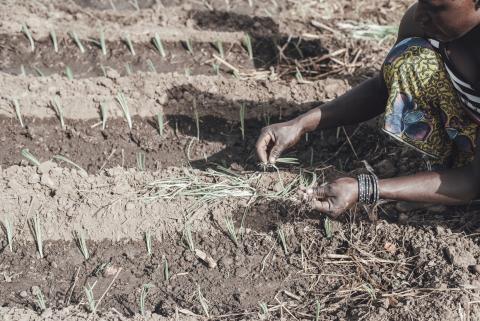Climate action and nutrition: Pathways to impact
This is a summary of the following paper: FAO (2023) Climate action and nutrition –Pathways to impact. https://doi.org/10.4060/cc8415en
Malnutrition and climate change are both pressing global issues, needing comprehensive interventions to address their multifaceted impacts on health, economies, and the environment. Malnutrition and climate change are interconnected due to the interdependence of climate, ecosystems, biodiversity, and human societies. Populations most vulnerable to malnutrition are also those most at risk from the negative effects of climate change. Addressing both through integrated action offers a singular solution to significant sustainable development obstacles.
“The impact of malnutrition in all its forms on the global economy is an estimated USD 3.5 trillion each year, and climate change is predicted to cost USD 178 trillion by 2070”
This paper focuses on the 4 core systems supporting the interconnection of climate and nutrition: agrifood, water, social protection, and health. Integrated action within these systems can positively impact various national priorities simultaneously, including climate change, nutrition, and sustainable development. For each system, the report describes the system’s importance in regard to good nutrition and summarises the evidence of the system’s interaction with climate change. The report then proposes integrated actions and highlights corresponding potential nutrition-relevant and climate-relevant outcomes alongside their key enablers. Text is supported by useful tables and diagrams illustrating the interlinkages.
Proposed integrated actions within agrifood systems include diversifying production, sustainable soil management, reducing food waste and loss, enabling local markets, practicing sustainable procurement, aligning policies for biodiversity–climate–water–nutrition benefits, and implementing dietary guidelines considering sustainability, with a focus on reducing gender inequalities.
For water systems, proposed integrated actions include holistic governance, stakeholder engagement, technology integration, reduced water consumption, updated water, sanitation, and hygiene policies addressing climate change, and gender-responsive water, sanitation, and hygiene.
Social protection systems need inclusive climate adaptation, which supports livelihoods, disaster strategies integrating food needs, and gender-transformative approaches.
Integrated actions within health systems include increased data availability and use, nutrition integration, reduced environmental impact, One Health approaches, gender mainstreaming in health systems' climate response, and strengthened early warning systems.
For all systems, gaps remain in our understanding of key influencers and enablers within pathways of integrated action to impact. The report calls for the development of a comprehensive and strategic research agenda to address this. It also highlights the underlying need for peace and stability, given that conflict, civil unrest, and displacement increase vulnerability to malnutrition and exacerbate the negative impacts of climate change.
In conclusion, the report underscores the urgency of integrated action to address climate change and malnutrition. Through detailed response options and pathways, it advocates for more collaborative efforts, increased evidence, and a focus on sustainable development. Integrated policies and action are positioned as the key to achieving progress across diverse global priorities, stressing the interconnectedness of climate and nutrition in the pursuit of a healthier, more resilient world. The Initiative on Climate Action and Nutrition (I-CAN) launched in 2022 at COP27 is highlighted as a crucial global multisectoral multistakeholder collaboration to drive forward transformative action.


